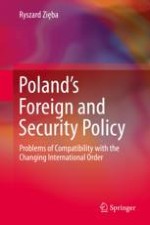2020 | OriginalPaper | Chapter
8. Poland’s Decreasing Activeness for Collective Security at the UN and OSCE
Author : Ryszard Zięba
Published in: Poland’s Foreign and Security Policy
Publisher: Springer International Publishing
Activate our intelligent search to find suitable subject content or patents.
Select sections of text to find matching patents with Artificial Intelligence. powered by
Select sections of text to find additional relevant content using AI-assisted search. powered by
